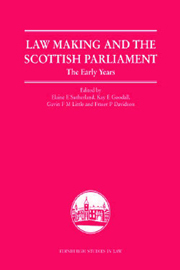Book contents
- Frontmatter
- Contents
- Preface
- List of Contributors
- Table of Cases
- Table of Westminster Statutes
- Table of Scottish Parliament Statutes
- Table of Westminster Statutory Instruments
- Table of Scottish Statutory Instruments
- THE SCOTTISH PARLIAMENT – ITS GENESIS AND OPERATION
- RIGHTS AND SOCIETY
- 3 Human Rights and People and Society
- 4 Child and Family Law: Progress and Pusillanimity
- 5 Culture
- 6 Charity Law: An Issue of Choice
- PUBLIC ADMINISTRATION AND SERVICES
- JUSTICE AND LEGAL SYSTEM
- ECONOMY AND ENVIRONMENT
- Index
4 - Child and Family Law: Progress and Pusillanimity
from RIGHTS AND SOCIETY
Published online by Cambridge University Press: 05 September 2013
- Frontmatter
- Contents
- Preface
- List of Contributors
- Table of Cases
- Table of Westminster Statutes
- Table of Scottish Parliament Statutes
- Table of Westminster Statutory Instruments
- Table of Scottish Statutory Instruments
- THE SCOTTISH PARLIAMENT – ITS GENESIS AND OPERATION
- RIGHTS AND SOCIETY
- 3 Human Rights and People and Society
- 4 Child and Family Law: Progress and Pusillanimity
- 5 Culture
- 6 Charity Law: An Issue of Choice
- PUBLIC ADMINISTRATION AND SERVICES
- JUSTICE AND LEGAL SYSTEM
- ECONOMY AND ENVIRONMENT
- Index
Summary
INTRODUCTION
Any assessment of the Scottish Parliament's contribution to child and family law necessarily involves measuring its output against criteria. Happily, selecting the criteria is one of the privileges of the author. In this chapter, what the Parliament has achieved will be assessed in the light of the problems it was designed to solve; the promises held out for it by its creators; and the subject-specific goals of child and family law itself.
Scotland has long had an embarrassment of riches when it came to proposals for reform of child and family law, many emanating from the Scottish Law Commission. In common with other areas of Scots law, the pre-devolution problem lay in these proposals having to compete for precious parliamentary time at Westminster. Thus it was that no-fault divorce reached Scotland seven years after similar reform was implemented in England and Wales. Other Commission proposals, like those on cohabitants, simply languished, unimplemented, in the bowels of the Scottish Office. There was also a perception of a degree of indifference at Westminster to Scottish matters: something demonstrated when Ian Lang, then Secretary of State for Scotland, rose to inform the House of Commons that he had published Lord Clyde's report on the highly controversial Orkney child protection case. Such was the exodus from the House that the proceedings were interrupted by the noise of departing feet. These concerns were acknowledged in Scotland's Parliament, the White Paper that preceded devolution, when it noted the need for a “more effective democratic framework” for Scotland.
- Type
- Chapter
- Information
- Law Making and the Scottish ParliamentThe Early Years, pp. 58 - 83Publisher: Edinburgh University PressPrint publication year: 2011



